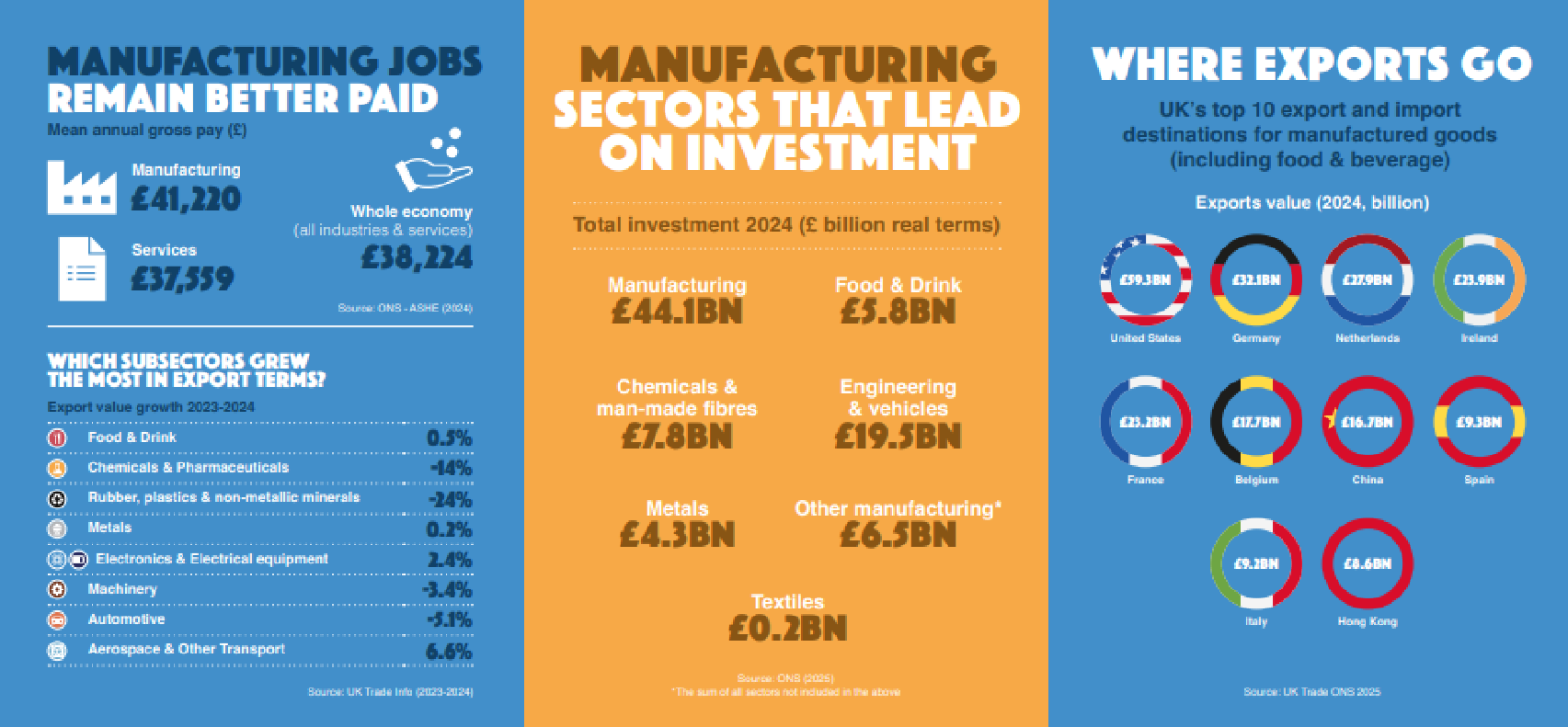THE NATIONAL
MANUFACTURING SKILLS
TASK FORCE
Working together to address UK manufacturing skills gaps
Introduction
The National Manufacturing Skills Task Force was formed in 2020, comprising representatives from industry and trade unions to work with Government colleagues as well as other stakeholders to collectively make a positive impact on the skills challenges facing all industries in the manufacturing sector.
Manufacturing powerhouse
Manufacturing is of strategic importance to the UK, not only for its contribution to the economy but for its role in driving innovation, productivity and progress towards net zero. It is a 21st-century sector that provides high-quality, transferable skills and creates value across regions, industries and supply chains.
The UK is one of the world’s top 15 largest manufacturing economies, generating £220 billion of output and accounting for 42% of the UK’s total exports of goods.
The manufacturing sector employs 2.6 million people across the UK and offers average wages around 8% higher than the rest of the economy. Manufacturing remains a major driver of innovation, contributing 48% of UK R&D and 17% of total business investment.
UK manufacturing supports:
-
Sustainability and the transition to net zero
-
Local communities and high-value jobs across the UK
-
Resilient domestic and global supply chains
-
Innovation, productivity and long-term economic growth
Manufacturing continues to be a cornerstone of the UK economy — backing British industry and engineering the future.
Strength in numbers and a unified vision
Since its inception in 2020, the Task Force has continued to grow and attract new members to ensure complete coverage of the breadth of manufacturing.
Members of the Task Force are:
-
ADS Group
-
Association British Pharmaceuticals
-
British Ceramic Confederation
-
British Plastics Federation
-
Chemical Industries Association
-
Cogent Skills
-
Composites UK
-
CSEU & Unite
-
Construction Equipment Association
-
Engineering and Machinery Alliance
-
Enginuity
-
Food & Drink Federation
-
Furniture Makers/FIESTA
-
HVMC
-
Make UK
-
Make UK Defence
-
National Skills Academy: Food & Drink
-
SMMT
-
TUC
-
UK Metals Council
-
UK Steel
-
Chairs of Auto and Aero Skills Working Groups
The National Manufacturing Skills Task Force is an inclusive group that welcomes participation from organisations who are committed to providing cross manufacturing strategic leadership on skills, maximising collaborative opportunities, facilitating practical and impactful change and interventions, and promoting the role of the Task Force to manufacturing employers and individuals.
Purpose
The National Manufacturing Skills Task Force is the catalyst for bringing strategic leadership, critical mass, and a unified and strong voice to address the critical shared skills challenges. The principal aim of the Task Force is to work in unison to ensure that manufacturing both retains and attracts the skills and talent it needs now and in the future. Convening clear proposals for intervention, this unique forum has worked in partnership with Government and others, on a number of key initiatives, including:
-
FE Skills White Paper
-
HGV Driver Shortage
-
DWP Manufacturing Microsite and Podcasts
-
No 10 Skills Delivery Plan
-
DfE T Levels working group
-
Development of the Gatsby Educational Landscape guide
-
Subsuming the work of the DfE Apprenticeships in Manufacturing group
-
Advanced Manufacturing Plan
Key objectives
The Task Force is keen to work with all parts of Government to:
-
Improve the image and recognition of the importance and diversity of the sector as an employer, and a fantastic place to work for people of all ages
-
Ensure the growth of high quality, appropriately funded apprenticeships at all levels
-
Identify the common skills needs of the existing and future workforce including:
- Digital
- Net-zero
- Leadership and management
- Creativity and innovation -
Develop an appropriate and cost effective ecosystem to meet the upskilling and reskilling needs of employers
-
Improve the ‘user friendliness’ of the skills system for SMEs to drive their participation and investment
Value for employers and members
The National Manufacturing Skills Task Force is founded around the concept of partnership and cooperation bringing together manufacturing, employers and trade unions to work collectively to address common skills challenges by:
-
Emphasising the shared skills issues across all of manufacturing whilst recognising the individual nuances of the sectors within it
-
Working collaboratively for the common good of manufacturing whilst respecting the individual members need for an individual voice
-
Providing a focal point for discussion and intervention between employers and individuals across manufacturing with Government departments
-
Being a strong and single voice to represent manufacturing’s skills needs to Government and wider stakeholders and raise the collective importance of manufacturing
By being part of the Task Force, individual members can leverage all that is common and shared across manufacturing whilst also recognising, appreciating and supporting individual differences.
Get involved
The Task Force has a unified and ambitious vision to drive the interventions needed in the UK manufacturing sector. We don't underestimate the scale of the challenge, and welcome the support of other organisations who can help us achieve the Task Force's vision.
© The National Manufacturing Skills Taskforce 2024
